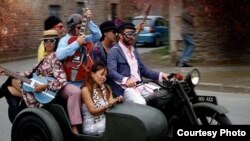Since 2009 the Cambodian-Australian band The Cambodian Space Project has been at the forefront of a rock and roll revival in the Kingdom, and next week the group will bring the lost sounds of pre-Khmer Rouge Cambodia to Washington, DC.
Kak Chanthy, 38, also known as Srey Thy, said she was honored to have been invited to play at the Kennedy Center, where the band will perform their usual repertoire of covers and original psychedelic rock.
“It is very special that we are invited to perform on a very big stage and in a very big city. It is unbelievable,” she said.
Perhaps more at home among the rice paddies and rural villages of her home province of Prey Veng, Chanthy formed The Cambodian Space Project after being approached by Tasmanian musician Julien Poulson while working as a karaoke singer at a bar in Phnom Penh.
Lost Rock and Roll
Inspired by the great artists of Cambodia’s golden era of the 1960s, the band aims to revive the country’s lost rock and roll scene, eviscerated during the reign of the Khmer Rouge.
Fans of the band will hear original favorites such as “Whiskey Cambodia”, as well as covers of 1960s divas such as Pan Ron and Ros Sereysothea.
Cambodia’s music scene in the 1960s was heavily influenced by American music brought to Southeast Asia during the U.S. war against Vietnam. Bands like Baksei Cham Krong, Bayon and Draka introduced Phnom Penh to new sounds, said Seng Dara, a music lover who works to preserve old songs.
“They were highly educated artists. Though they were influenced by western culture, they were able to integrate western music to be authentically Khmer,” he said. “It’s good to conserve pure Khmer culture, but it’s not very creative.”
Towards the end of the Vietnam war, the Khmer Rouge occupied Phnom Penh and all possibility of a modernist state in Cambodia that embraced foreign influences was wiped out. Intellectuals, artists and musicians were targeted by the regime. Documents, songs and cultural records were destroyed and those identified as part of the “cultural elite” were sentenced to death. An estimated 1.7 million lives were lost.
The Cambodian Space Project Takes Off
Chanthy’s inspiration for song writing either comes from the heart of the head, she says.
“Their songs [in the 1960s] are very deep in the heart. When I started writing my own songs, I didn’t have a mentor. But what I experience, see and feel, which can be easily forgotten, I put into words, I put it into a song so that it will always be meaningful and remembered,” she said.
Chanthy dropped out of school in grade three with only a basic ability to read and write, which has made communicating with composers her greatest challenge, she says.
“I don’t know melody. I don’t know the ‘do, re, mi’ things. We use body language. I raise my hands up, they play the high keys, and as I put my hands down they play lower keys,” she said.
Her musical idol is Pan Ron, who became a national star in Cambodia in the mid-60s when she teamed up with Sinn Sisamouth and was thought to have been executed in the final days of the Khmer Rouge regime.
“Her songs are sexy. Her laugh and sense of humor and her voice are beautiful. Ros Serey Sothea also had a golden voice. But Pan Ron, you know, it’s just like me, we only fit with rock and roll because we’re a funny kind of person. Not sentimental. I’m very playful,” she said.
Chanthy’s mother, she says, was the best singer in her town in Prey Veng, while her father would often listen to music on the radio.
Aged 19, Chanthy moved to Phnom Penh in search of a job. She was almost duped into working in a brothel, but managed to escape and has since tried her hand at everything from construction to souvenir store owner.
“Rock and roll is the type of music genre that helps people get relief and become happy. It helps them get out of painful feelings because of its humble and funny lyrics,” she said.
Rock revival
The Cambodian Space Project was the subject of the feature-length film “Not Easy Rock’n’Roll”, which premiered in 2015 and later screened on the BBC.
Neither Chanthy nor Poulson expected that they would be performing in front of such large audiences just eight years after forming.
Marc Eberle, the director of “Not Easy Rock’n’Roll”, said the film’s recent screening on BBC World was “a great way to bring Cambodian culture to the world. In many countries in South America, Africa and across Asia the story resonates well with the audience.”
Along with The Cambodian Space Project, Dengue Fever, another Cambodian-western fusion band, pursues a similar mission to preserve and innovate in the Cambodian music scene.
Jimmy Kiss, a rising Cambodian pop-rock musician, says he is impressed by the current state of Cambodian rock and roll.
He disagrees with people who say that Cambodia’s music industry is stuck in a rut.
“The only difference between musicians in the past and the musicians in the present is how people value the music. There are so many talented musicians out there nowadays. The thing is that people in the past valued musicians more than people do now,” he claimed.








